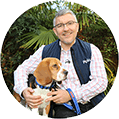From staring at you to eating poop or grass, we answer six commonly asked dog behaviour questions, with the help of Petplan expert behaviourist Nick Jones.
Have you ever wondered why your dog eats grass, or perhaps why they can’t seem to stop licking you? If you’re curious about the reasons behind these behaviours and more, Petplan expert behaviourist Nick Jones is here to answer six common questions.
1. Why does my dog stare at me?
Have you ever felt like you’re being watched? Some dogs seem to love staring at their owners and there can be a few different explanations for this behaviour. Sometimes, your dog staring at you is simply an expression of their love for you.
If you’re about to throw your dog’s favourite toy, it’s no surprise that your dog will be incredibly focused on you – and the toy. During training sessions, some dogs will also stare intently at their owners, waiting for the next command. Your dog might also be trying to tell you something – dogs use a lot of non-verbal body language, so perhaps the stare is their way of telling you dinner is late.
2. Why does my dog keep licking me?
Some dogs just can’t seem to resist licking their owners. Licking can sometimes be a way for your dog to explore their environment, so if your dog only licks you every now and again, they might be checking a new scent or taste.
Licking is also a nurturing behaviour, seen between a mother dog and her puppies. So your dog might be licking you to let you know they love you.
It can also be a way for some dogs to communicate that they want some attention or are ready for their dinner. If you give your dog attention every time they lick you, you’re inadvertently training them to lick you even more.
3. Why does my dog follow me everywhere?
If every time you turn around, your dog is right behind you, you might be wondering why they’re following your every move. Dogs are naturally sociable and simply love being in the company of others, whether that’s another dog or you.
Some dogs are more likely to follow their owners than others, while others will only follow a certain person. This can depend on both their breed and what they’re used to. If your dog seems happy being left home alone, you probably don’t need to do anything. But sometimes, excessive following can be a sign of separation anxiety. In this case, it’s always best to speak to your vet or a qualified behaviourist for tailored advice.
4. Why does my dog eat poop?
It’s a bit of an unpleasant habit – but is it anything to worry about? The scientific term for this behaviour is coprophagia and the good news is that it’s perfectly normal. It’s most often seen in mother dogs, who eat their puppies’ poop when cleaning up. Some puppies copy this behaviour and then grow out of it before they’re a year old, while others continue into adulthood.
Luckily, eating poop doesn’t seem to indicate that anything is wrong with your dog’s diet. It could just be that poop tastes interesting to your dog or they can smell some undigested food. Some dogs also eat poop when they’re bored or lonely, and there is a risk of being infected with parasites by doing so. If you do see your dog eating poop regularly, it’s worth speaking to your vet for advice.
5. Why does my dog eat grass?
Many dog owners used to think their dogs only ate grass when they were feeling unwell, but that’s now been proven to be a myth. There doesn’t seem to be one specific explanation for this behaviour and it’s pretty common. Vets and behaviourists think that perhaps some dogs eat grass because they’re feeling unwell, while others just seem to enjoy the taste.
If your dog is generally healthy and has a good appetite for their usual diet, then nibbling on a little grass from time to time shouldn’t be a problem. It’s worth keeping an eye on the colour and consistency of their poop though and speaking to your vet if you have any concerns.
6. Why does my dog shake?
Shaking can be down to a few different reasons, so it’s always important to figure out the explanation behind this behaviour. Some dogs, especially breeds with thin coats such as Greyhounds, can shiver when they’re cold. Others may tremble with excitement when you’re getting ready to take them for a walk or throw their favourite ball. But fear and anxiety can also be a trigger for shaking, with fireworks and thunder often causing nervous dogs to shake.
Sometimes, shaking or twitching can be a symptom of poisoning, so if you’re concerned your dog ate something they shouldn’t have, speak to your vet urgently.
Another cause of shaking is genetic, with generalised tremor syndrome seen in some breeds such as West Highland White Terriers and Chihuahuas. Other health conditions such as canine distemper virus and epilepsy can also cause shaking. If you’re worried about your dog’s shaking, ask your vet for advice.
Does your dog have any of these habits? Or perhaps you’ve noticed them doing something else equally as puzzling? Share your ideas and tips on social media using #PethoodStories.
